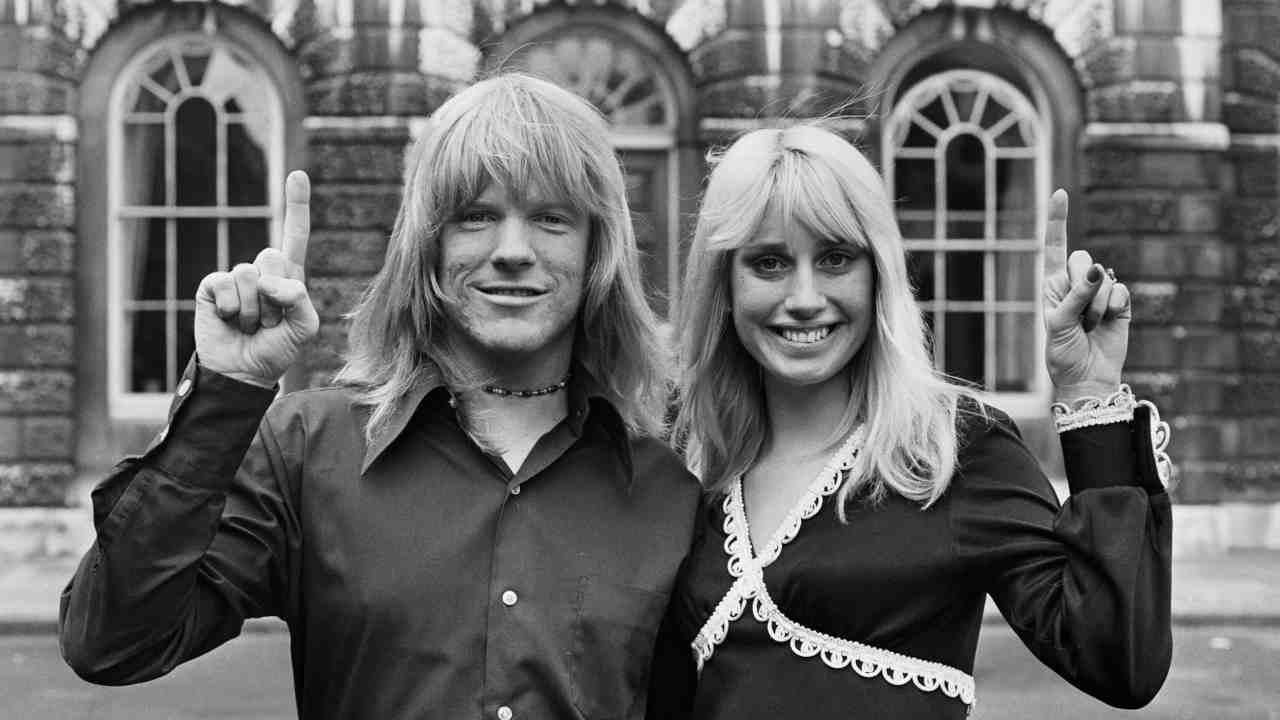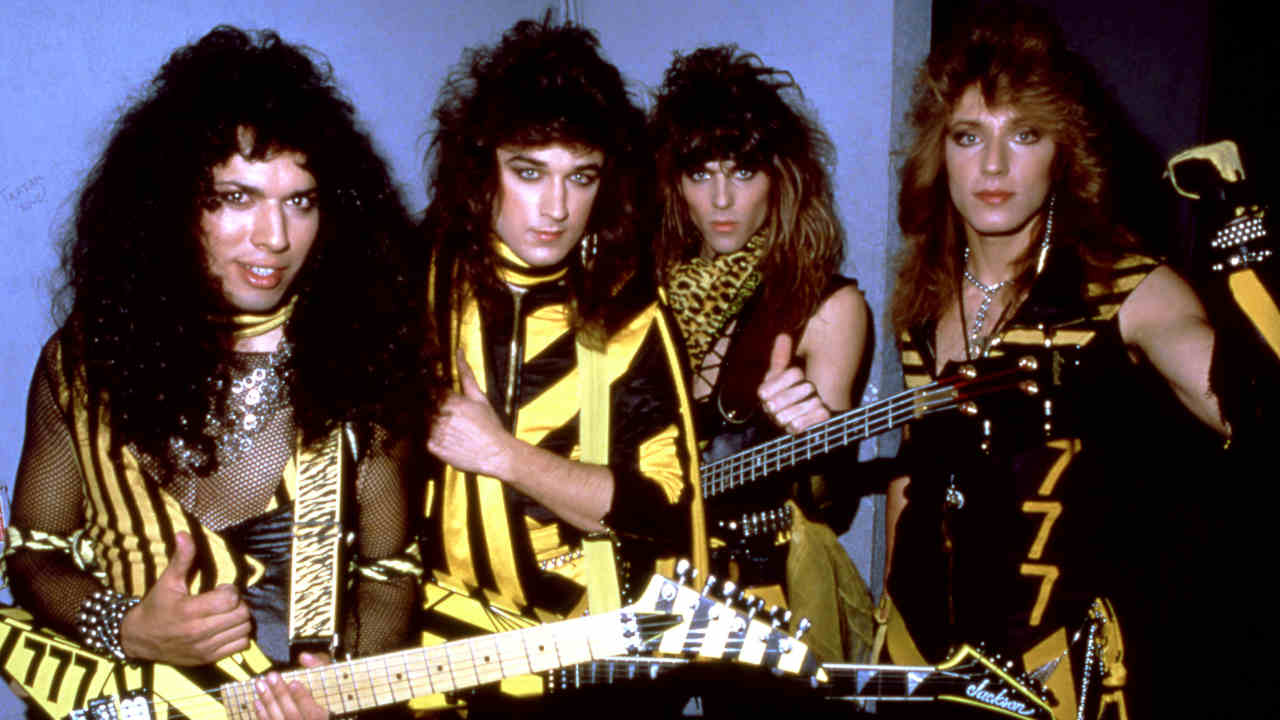
It’s always been so damn hard to get hold of Christian AOR albums in the UK. In the 1980s, at the height of the genre’s overseas popularity, the hardened collector might be forced to travel to and trawl through specialist Christian bookstores, the kinds of places where 600 different versions of the Bible were available – and, if you were lucky, the latest album by Petra.
Sure, you could easily get hold of records by the more mainstream likes of Stryper, but if you wanted the hardcore, under-the-counter kinda stuff, you wouldn’t find it in a Christian reading emporium. No, for the AOR cognoscenti, one would have to undertake clandestine trips to the likes of Lotus Records in Hanley, Staffordshire or Dual Edge in London to get that fix. This gave the genre the feel of an underground, cult movement, albeit one with massive mainstream appeal, especially in the States.
Christian rock was pretty much kick-started by Larry Norman with his 1969 opus Upon This Rock. The record’s influence was far-reaching, inspiring a whole new breed of bands all keen to push their message forward. Upon hearing the clarion call sounded by Norman, bands like Servant, Petra, The Resurrection Band and The Sweet Comfort Band began to challenge the secular market for a slice of that lucrative pie. Christian AOR was born.
While The Resurrection Band would go on to have a healthy career before morphing into the equally popular Rez Band, it was the likes of Servant who were catching the ear of the hardened AOR fan. Like The Resurrection Band, Servant’s roots lay in the so-called ‘Jesus Movement’ of the late 60s. Formed by Owen and Sandie Brock in 1975 (first as Higher Ground), it would be four long years before the band would release their debut album, Shallow Water, produced by future Metallica producer Bob Rock.
While not the most auspicious of debuts, it did lay the groundwork for what was to follow. With their third album, 1982’s World Of Sand, Servant’s true sound took shape, moving into the realms of pomp, albeit in a very whimsical and twee manner. By 1983 and the subsequent Caught In The Act Of Loving Him album, the band were in full stride. The surging pomp of Burning Bridges and the cool AOR of Thank God both showcase the immense talents of vocalist Sandie Brock, and the album is the jewel in Servant’s crown. After releasing a further two albums the band called it a day in 1990.

For The Sweet Comfort Band, persistence and constant roadwork would similarly pay eventual dividends. Put together in 1972 by vocalist Bryan Duncan alongside brothers Kevin and Rick Thomson, they were joined by guitarist Randy Thomas four years later and cut their debut album the following year. While their first three albums (Sweet Comfort, Breakin’ The Ice and Hold On Tight) inhabited the West Coast/jazz-fusion territory that the likes of Toto were making their own, their fourth album would take them to a whole new level.
Often regarded as a rival to the Boston/Toto/Kansas/Journey invasion of the late 70s, The Sweet Comfort Band finally delivered their promise with 1981’s multi-faceted Hearts Of Fire, where West Coast, AOR and pomp all battled for supremacy in the name of the Lord; a real peach of an album. By the time of 1982’s Cutting Edge, they were plying immense AOR laced with pomp-rock pretensions, and this, my friends, was the real deal. Bryan Duncan’s vocals soared, while his keyboard work was also exemplary. Tracks like Runnin’ To Win and the windswept What Have We Got are Christian AOR at its best. Indeed, this album would certainly have been the The Sweet Comfort Band’s finest hour, if not for what followed.
In 1984, the group hooked up with John Elefante for Perfect Timing. With Elefante having just left Kansas, he brought with him a wealth of talent and ideas, and wasn’t afraid to share them. Whether or not those ideas had originally been intended for Kansas is anyone’s guess, but Elefante gave the band an edge that set Perfect Timing apart from its predecessors. The album sounded like a hybrid of Kansas’ Drastic Measures and Uriah Heep’s Abominog, with the results being some of the finest pomp ever produced by a Christian band.
Boasting the Styx-esque Sing For The Melody, the quasi-Kansas strains of Habit Of Hate and the damn-near-perfect AOR of Don’t Bother Me Now, this album has it all. Following the band’s demise in 1985, Duncan forged a fine solo career, though The Sweet Comfort Band reunited in 2010 and released a brand new album, The Waiting Is Over, three years later.
Meanwhile, guitarist Randy Thomas joined forces with longtime friend Bob Carlisle to form Allies, widely regarded by AOR fans as one of the finest that the genre has to offer. Recording six albums over eight years, the success of Allies was down to the gold-coated vocals of Bob Carlisle, whose pipes rivalled the likes of Michael Bolton and Jimi Jamison. The pure AOR of Allies’ self-titled debut from 1985 struck a chord with most secular AOR fans. Much like Michael Bolton, Carlisle would find fame beyond Allies with the multi-million-selling, Grammy-winning ballad Butterfly Kisses in 1997.
While they would become one of the biggest Christian acts of the 80s, Petra had their roots in the 70s scene. Their mix of evangelism and rock placed them at the forefront of the aforementioned ‘Jesus Movement’. Named after the Greek word for ‘rock’ – and not after the Blue Peter pooch – Petra’s early years revolved around a blues style that wouldn’t really garner them attention until the addition of singer Greg X. Volz with the group’s third album, Washes Whiter Than, in 1979. Bringing a heavier style to the band’s sound, Volz would record five studio albums before departing in 1985 to pursue a solo career. Wasting no time in finding Volz’s replacement, founder member Bob Hartman hired former Head East vocalist John Schlitt. Having cut a glut of albums with Head East before finding Christianity through the influence of his wife, Schlitt had quit the music business for several years. But he needed little convincing to join the band, and was introduced to Petra fans on an Australian tour in 1986.
On 1986’s John and Dino Elefante-produced Back To The Streets and the much heavier This Means War (1987) and On Fire (1988), the Schlitt-led Petra would rival most secular artists. But it was the recording of 1989’s Petra Praise: The Rock Cries Out, an album of worship standards such as King Of Kings and Take Me In, that launched the band to greater heights. According to John Schlitt, the project was the sound of “the band going out on a limb”.
While the Christian rock scene was exploding, Petra were hard at work on what would prove to be their most commercial album, the arena rock-influenced Beyond Belief. With the Elefantes once again at the desk, Petra’s new sound was nothing short of monstrous. Likened to Def Leppard by Christian music magazine CCM, the album boasted a huge sound, as evinced on Armed And Dangerous and I Am On The Rock in particular.
On the band’s newfound success, Bob Hartman said: “There’s a lot of great things happening with Christian music, and I just hope that we can be appreciated for what we do.”
Playing to over 10,000 people a night on the subsequent tour, the band earned Grammy and Dove awards, which was hopefully all the appreciation that Hartman needed. But while Petra would remain active for a further 16 years, they never matched the power or style of this album.
Meanwhile, another band was carving out a niche all of its own: Indiana-based White Heart. Formed in 1982 by Billy Smiley, Mark Gersmehl, Steve Green and brothers Dann and David Huff, White Heart were rejected by every Christian label, before being picked up by Home Sweet Home Records. Named by vocalist Steve Green as the opposite of Joan Jett’s Blackhearts, White Heart’s first three albums went on to sell over 250,000 copies, but only hinted at what was to come.
Surviving the departures of the Huff brothers (who went on to form Giant), vocalist Steve Green and his replacement Scott Douglas – who exited after being jailed for sex-related crimes in 1985 – White Heart finally found a settled line-up, with former roadie Rick Florian taking up the vocal duties on transitional 1986 album Don’t Wait For The Movie.
By the time the band had recorded Freedom in 1989, they were well on the way to defining their sound. While not their most commercially successful album, Freedom is considered by many to be the peak of the band’s career. Having parted company with their record label and producer the following year, they signed with Star Song and released Powerhouse to critical acclaim. But it was its follow-up, 1992’s superb Tales Of Wonder, which garnered them the most success of their career. Its multi-layered sound combined the best elements of Toto and latter-day Yes to create one of the finest Christian albums of the 90s. Although the band never officially split up, Billy Smiley has stated that “we are on an eternal sabbatical of sorts”. A reunion concert was planned for last year, but was subsequently postponed.
While the Christian AOR scene was flourishing, its more melodic metal-orientated brethren were springing up at an alarming rate. For every secular hair metal band like Mötley Crüe, W.A.S.P., Ratt or Dokken, there was a Christian doppelgänger. The likes of Mass, Holy Soldier, Bloodgood, Guardian, Whitecross and Barren Cross were making a name for themselves, but one band stood out from the pack. Covered in garish yellow-and-black spandex, Stryper turned into a Bible-thumping behemoth.

Stryper were formed in 1982 in Orange County, California by brothers Michael and Robert Sweet, Oz Fox and Tim Gaines (who joined the band from the secular group Stormer). Initially going under the name of Roxx Regime, the name-change ensued after the group dedicated themselves to God. An acronym apparently standing for ‘Salvation Through Redemption Yielding Peace Encouragement and Righteousness’, Stryper made their name on the hedonistic Hollywood club scene – a strange place to find a devout Christian band, perhaps. But as Michael Sweet said at the time: “We didn’t grow up on Christian music, we didn’t grow up in the church, we grew up with metal and the Hollywood club scene. That’s our history.”
A demo recorded back in their Roxx Regime days secured them a deal with Enigma records, releasing their 1984 debut mini-album The Yellow And Black Attack. The back cover showed four grown men sporting the kind of haircuts that would make Hirsh Gardner of New England jealous, and wearing prototypes of their trademark yellow-and-black outfits (a gimmick that Michael Sweet has since denounced, saying: “If it had been up to me, I probably wouldn’t have done the yellow and black back in the day.”)
While Sweet may not have loved his band’s image, they certainly milked it for all it was worth. On the cover of their first full-length album, Soldiers Under Command, they were awash with the stuff. Together with Stryper’s Bible-throwing antics, bombarding their audiences with paperback versions of the Book Of God at shows, they were proving to be a pretty irresistible draw. While the likes of W.A.S.P. were screeching to the perverted, Stryper were preaching to the converted.
By the time their debut full-length To Hell With The Devil was released in 1986, Stryper were well on their way to becoming platinum-sellers, thanks mostly to the success of their ballad Honestly, which peaked at No.23 on the Billboard charts, with its video proving popular on MTV.
For many, their fourth release, 1988’s In God We Trust, was the last great Stryper album, with 1990 follow-up Against The Law marking the end of an era. As Stryper saw in the new decade with a new image and lyrical direction, Michael Sweet played down their new appearance: “We are sometimes referred to as a gimmicky band, but I’d like our music to overshadow the yellow and black.”
That didn’t happen, sadly, as Stryper imploded two years later with Michael Sweet quitting for a solo career, the three remaining members carrying on for another year before splitting. Having got back together a decade later, they are still making records to this day, and are once again clad in the yellow and black.
For every major-league player on the Christian AOR scene, there was a glut of acts all looking to prise their way through the door marked ‘success’. The secular scene was throwing out obscurities at a wallet-busting rate in the 80s, and the Christian market did its best to keep up. Bands like the marvellous Fighter, Cindy Cruse, Sure Conviction, Rhythm House, Halo, Norman/Sexton, Rachel Rachel and Faith Nation are all worth investigating, but one of the finest Christian combos around was The Brave. On 1992’s Battle Cries they displayed the kind of pompy AOR that wouldn’t have been out of place on a Tour De Force album. Sadly, their sophomore release embraced grunge, after which they sank without trace, though they did subsequently reunite.
Leading the way in the obscurity stakes would have to be 20/Twenty and their 1987 album Altered. As rare as rocking-horse teeth, its keyboard-driven AOR that wasn’t too dissimilar to that plied by White Heart. Meanwhile, their frontman Ron Collins release a marvellous solo album, Simple Man, back in 1992.
While the 90s decimated secular AOR, driving it underground, it still survived – albeit on a smaller, scale. But the Christian AOR scene just seemed to vanish altogether. Whereas in the past you could buy these albums from most Christian bookstores, the groups involved started to pander more to the adult contemporary market, and Christian radio deemed rock a format that just didn’t matter to them anymore.
But there were been pockets of resistance on the Christian underground in the late 2000s. Of the old-school bands it’s the likes of Mastedon (note: not Mastodon) and their wonderful III album, released by Frontiers in 2010, which are leading the way. Spearheaded by John Elefante, whose role in Christian AOR over the last three decades is unparalleled, it is one of the best Christian albums of the last two decades.
Also proving that the scene is on the up were quality releases from the likes of Sweet Crystal, Line Of Fire, Mike Florio and the Steve Perry-esque Joseph Chandler.
“Melodic rock never really went away, it just got overshadowed by passing musical fads,” Mike Maxwell, leader of the overlooked Cry Holy, said in 2012. “I see no reason as to why a Christian band can’t be as big as, say, Journey. The possibility is certainly there.”
Amen to that!
Originally published in Classic Rock Presents AOR issue 6







